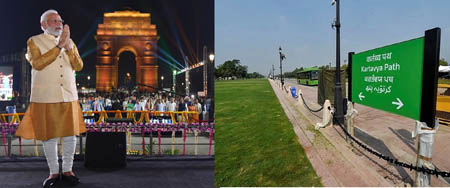“IT is essential that we think about our national identity. Without this identity there is no meaning of independence, nor can Independence become the instrument of progress and happiness. As long as we are unaware of our national identity, we cannot recognise or develop all our potentialities. Under alien rule this identity is suppressed. That is why nations wish to remain independent so that they can progress according to their natural bent and can experience happiness in their endeavour. …The Nation too, like the individual, falls a prey to numerous ills when its natural instincts are disregarded. The basic cause of the problems facing Bharat is the neglect of its national identity”.
— Pandit Deendayal Upadhyaya, ‘Our Direction’, Integral Humanism, Jagriti Prakashan, NOIDA, 1995 pp. 12-13
Whenever the question ‘what is there in a name?’ is asked, the name of Shakespeare invariably crops up in the same breath. It is ironic that without mention of the celebrated playwright, one cannot raise a question on the importance of the name. Similar questions have been raised about the symbolism involved in changing the nomenclature of the places; a recent one is the renaming of Rajpath to Kartavya Path. The approach of ruling the illiterate, uneducated, to be civilised is reflected in the same.In national life, especially for a country like Bharat, with centuries of colonial past, such exercise acquires more significance in decolonising our minds.
While elaborating on the five resolutions for the Amrit Kaal in his Independence Day speech, Prime Minister Modi called to remove any trace of the colonial mindset. Rajpath turning into Kartavya Path should be seen as the action programme for the same.
The colonisation process is excruciating and brutal. Along with the political subjugation, it also leads to social, psychological, economic and cultural tormenting. The earlier invaders desecrated and destroyed the places of pilgrimage with the intent of attacking the dignity, unity, soul and sacredness of Mother Bharat. The British continued that process more clinically through the laws, education and other instruments of servitude. This long and systematic process ingrained the divisive and degraded self-perception. We gained Independence politically, but the colonisation of intellectual space continued.
After Independence, the political leadership changed a few colonial symbols. Still, the fundamental thinking behind the State functioning and the character of Lutyens’ Delhi did not change. The reconstruction of sacred places at Somnath and Ayodhya was seen as ‘communal’ initiatives instead of decolonisation. The education system, the influence of English in the bureaucratic and judicial proceedings and the thought progression behind implementing the Government schemes by and large remained colonial. The inspiration behind our freedom struggle was the spirit of Swadeshi and Vande Mataram. Suddenly, they became a sign of regression and saffronisation. The critical ingredients of nationhood, namely, glorious history, bravery and continuous struggle, scientific achievements, economic and commercial prosperity and civilisational heritage, have been systematically refuted. In other words, the colonial mindset persisted by the elites.
Few Governments took important steps in nationalising the state apparatus. Removing the statues of British officers, engraving Sanskrit verses in the Parliament, and delinking the budget presentation from the British timings are a few significant steps. The present dispensation has expedited that process by removing redundant laws, introducing the National Education Policy (NEP) with a focus on Bharatiya languages and flexibility in course options and creating a new cultural infrastructure. Restoration of Dharmic thinking for addressing the present problems and building the future Bharat that will guide the world with righteous power are critical ingredients for reshaping the intellectual space. To truly nationalise the intellectual space, we must develop our own parameters and objectives. Technological advancement and data sovereignty are fundamental to future solutions. We must encourage our youth to undertake research in these areas. World-class infrastructure and institutions also are the need of the hour. While doing so, we should keep the soul or chitti of Bharat, as explained by Deendayalji, in mind. The Government can be a facilitator, and leadership can be inspirational towards the path of decolonisation. But ultimately, society, including academia, think tanks and community leaders, has to reconnect with the roots and initiate another freedom movement to intellectually and culturally decolonise ourselves.




















Comments